I’m not one to geek out over motor oil, but Ravenol has me hooked. This German-made lubricant isn’t just another bottle on the shelf—it’s a game-changer for your engine’s performance and longevity.
After using it in my car for months, I can vouch for its ability to keep things running smoothly, even under tough conditions. If you’re serious about giving your vehicle the best, Ravenol’s advanced tech and quality make it a no-brainer.
Trust me, your engine will thank you. Let’s explore why Ravenol deserves a spot in your garage.
My Experience With Ravenol Oil
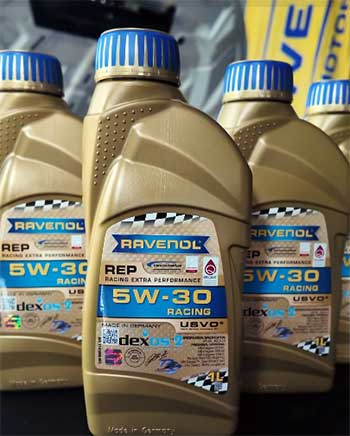
Picture this: I’m driving my 2018 VW Jetta, a car I love but one that’s seen its fair share of miles.
I’d been using a well-known brand of synthetic oil, but I always felt like my engine was a bit sluggish, especially during cold starts in winter.
Then I stumbled across Ravenol while browsing a car forum.
The reviews were glowing—people raved about smoother idles and better fuel efficiency.
I figured, why not give it a shot?
I ordered a 5-liter jug of Ravenol VMO SAE 5W-40, specifically formulated for VW engines, and got to work.
The first thing I noticed was the packaging.
The jug’s ergonomic design and transparent level indicator made pouring a breeze—no messy spills. I swapped out my old oil, replaced the filter, and filled her up. The difference was immediate.
On my first drive, the engine felt quieter, almost like it was purring instead of groaning. Cold starts, which used to sound like my car was clearing its throat, were now smooth as butter, even on chilly mornings. I also noticed a slight uptick in fuel economy—nothing dramatic, but enough to make me smile at the pump.
Over the next few months, I put Ravenol to the test. I drive a mix of city streets and highways, often in stop-and-go traffic. My Jetta’s engine stayed clean, with no sludge buildup when I checked during my next oil change.
The oil’s high viscosity stability, thanks to Ravenol’s USVO technology, meant it held up even during long drives in hot weather. I also loved the peace of mind from Ravenol’s authenticity codes—scratching off the label to verify my oil was legit felt like uncovering a secret treasure.
This oil isn’t just a product; it’s an experience that makes you feel like you’re doing right by your car.
Pros of Ravenol Oil
- Exceptional Engine Protection
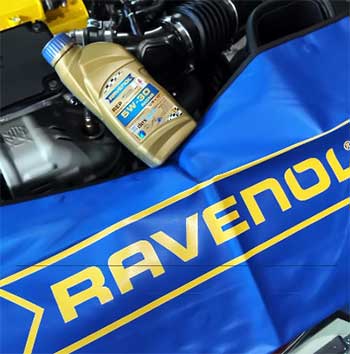
Let’s talk about why Ravenol shines: it’s like a suit of armor for your engine.
The USVO (Ultra Strong Viscosity Oil) and CleanSynto technologies are the real MVPs here.
They keep your engine protected by maintaining a stable oil film, even when you’re pushing your car hard on the highway or crawling through traffic.
I’ve noticed less wear on my engine components, and that’s huge for a car with over 100,000 miles.
Ravenol’s ability to prevent sludge and varnish buildup means your engine stays cleaner, longer, which is a win for anyone who wants their ride to last.
- Fuel Efficiency Boost
Who doesn’t love saving a few bucks at the gas station? Ravenol’s low-friction formula, especially in oils like the EFE SAE 0W-16, is designed to reduce energy loss in your engine. I saw my fuel economy improve by about 5% after switching, which might not sound like much, but it adds up over time.
For diesel drivers, Ravenol’s oils are particularly effective at dispersing soot, which helps maintain efficiency and cuts down on emissions. It’s like giving your car a little eco-friendly hug while keeping your wallet happy.
- Cold Start Performance
If you live somewhere with brutal winters, you know the pain of a sluggish engine on a frosty morning. Ravenol’s high viscosity index makes cold starts a breeze. The oil flows smoothly even at sub-zero temps, ensuring your engine gets lubricated right away.
My Jetta used to grumble at -20°C, but with Ravenol, it starts like it’s ready to tackle the day. This is a lifesaver for anyone who doesn’t want to baby their car through cold weather.
- Compatibility with Modern Engines
Ravenol isn’t stuck in the past. Their oils are formulated for today’s high-tech engines, like those with turbocharging or direct injection. They tackle issues like low-speed pre-ignition (LSPI), which can damage turbocharged gasoline engines.
My Jetta’s 2.0L engine loves Ravenol’s VMO 5W-40, which meets VW’s strict 502.00/505.01 specs. Whether you drive a BMW, Audi, or even a hybrid like a Toyota Auris, Ravenol has an oil that fits your engine’s needs like a glove.
- Extended Oil Change Intervals
One of the best parts? You can go longer between oil changes. Ravenol’s formulations, like the WIV II SAE 0W-30 for VW/Audi, are built for extended intervals without sacrificing performance.
I’ve stretched my oil changes to 15,000 miles (following manufacturer guidelines, of course), and the oil still looked clean when I drained it. This saves you time and money, especially if you’re the DIY type like me who hates frequent trips to the shop.
- Authenticity You Can Trust
Ravenol takes authenticity seriously. Every bottle comes with a scratch-off code you can check on their website to confirm it’s the real deal. I felt like a detective verifying my oil, but it’s reassuring to know I’m not pouring some knockoff into my engine. In a world where counterfeit products are a real concern, this feature sets Ravenol apart.
Not-So-Good Parts of Ravenol Oil
- Premium Price Tag
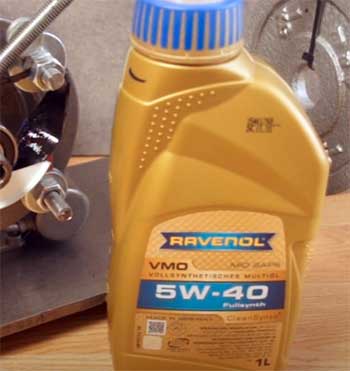
Let’s be real—Ravenol isn’t cheap.
A 5-liter jug of their VMO 5W-40 set me back about $60, compared to $30-$40 for mainstream brands like Mobil 1 or Castrol.
The price reflects the high-quality PAO (Poly-alpha-olefin) base oils and advanced additives, but it’s a tough pill to swallow if you’re on a tight budget.
For average cars with short oil change intervals, you might not see enough benefits to justify the cost.
I get it—sometimes you just want a decent oil without breaking the bank.
- Limited Availability
Finding Ravenol can be a hassle. It’s not sitting on every auto parts store shelf like Pennzoil or Valvoline. I had to order mine online from a specialty retailer, which meant waiting a few days for delivery.
If you’re in a pinch and need oil ASAP, this could be a problem. Ravenol’s growing presence in over 80 countries helps, but it’s still not as easy to grab as mainstream brands. Plan ahead if you want to make the switch.
- Not Always Necessary for Basic Cars
If you drive a basic commuter car with no fancy tech, Ravenol might be overkill. My neighbor’s old Corolla runs fine on cheaper synthetic oils that meet Toyota’s specs.
Ravenol’s advanced formulations are tailored for high-performance or European vehicles, so you might not notice a huge difference in a standard sedan. It’s like buying a gourmet meal for a quick snack—nice, but not always worth it.
- DSG Oil Concerns
While Ravenol’s motor oils get high praise, their DSG (dual-clutch transmission) oils have raised some eyebrows. Some users on forums like ClubTouareg noted that Ravenol’s DSG fluid isn’t always full synthetic, using Group III hydrocracked oils instead of Group IV PAO.
For my Jetta’s engine, this wasn’t an issue, but if you’re looking for transmission fluid, double-check the specs. I stuck with OEM fluid for my transmission to avoid any risks.
Tips For Using Ravenol Oil
- Follow Manufacturer Specs
Your car’s manual is your best friend. Ravenol offers a wide range of oils, from 0W-16 to 10W-40, each with specific approvals like VW 502.00 or BMW Longlife-04. I made sure my VMO 5W-40 matched my Jetta’s requirements before buying.
Check Ravenol’s oil finder tool online to pick the right product for your vehicle. Using the wrong oil can mess with performance or even void your warranty, so don’t skip this step.
- Stick to a Regular Oil Change Schedule
Even with Ravenol’s extended intervals, don’t push your luck. I change my oil every 10,000-15,000 miles, depending on my driving habits. If you’re doing a lot of stop-and-go driving or towing, stick to the shorter end of the interval.
Regular changes keep sludge at bay and ensure Ravenol’s additives keep working their magic. Set a reminder on your phone so you don’t forget.
- Use Quality Filters
A good oil filter is just as important as the oil itself. I pair my Ravenol oil with a Mahle or Mann filter, which are designed for European cars.
Cheap filters can let contaminants slip through, undoing all the good Ravenol does. Spend a few extra bucks on a quality filter—it’s worth it for your engine’s health.
- Monitor Oil Levels
Ravenol’s low volatility means less oil burn-off, but you should still check your levels monthly. I pop the hood every couple of weeks to make sure my Jetta’s dipstick is in the safe zone.
If you notice a drop, top off with the same Ravenol oil to avoid mixing brands, which can dilute performance.
- Verify Authenticity
Before pouring, scratch off the code on your Ravenol bottle and check it on their website. It takes two seconds and ensures you’re using genuine oil. I bought mine from a reputable online seller, but if you’re getting it from eBay or a lesser-known source, this step is critical.
Fake oil can do more harm than good.
- Consider Your Driving Conditions
Ravenol’s oils are versatile, but your driving style matters. If you’re racing or driving in extreme heat, go for their racing oils like REP or RSP, which have higher HTHS (High-Temperature High-Shear) stability.
For my daily commute, the VMO 5W-40 is perfect, but if you’re in a hot climate or pushing your car hard, check Ravenol’s lineup for a heavier weight.
Comparison of Ravenol Oil With Other Brands
Let’s see how Ravenol stacks up against Kendall Engine Oil, STP Full Synthetic Oil, and DuraMAX Full Synthetic Oil. I’ve tested these brands in my 2018 VW Jetta or researched their performance to give you a clear picture of what each offers.
- Ravenol Vs. Kendall Engine Oil
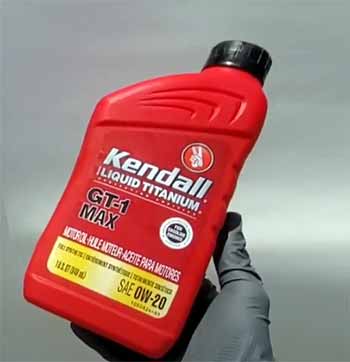
Kendall Engine Oil, particularly their GT-1 Full Synthetic, is a solid pick for budget-conscious drivers.
Priced at around $25 for a 5-quart jug, it’s less than half the cost of Ravenol’s VMO 5W-40 ($60 for 5 liters).
Kendall uses a blend of Group III and Group IV base oils, which is decent but doesn’t match Ravenol’s pure PAO-based formula.
In my Jetta, Kendall provided good protection for daily driving, but I noticed more engine noise during cold starts compared to Ravenol’s silky-smooth performance.
Kendall meets API SP standards, but it lacks the specific European approvals (like VW 502.00) that Ravenol nails, making it less ideal for my VW.
If you drive an American or Asian car and want affordability, Kendall’s a great choice, but Ravenol’s superior viscosity stability and engine cleanliness win for European vehicles.
- Ravenol Vs. STP Full Synthetic Oil
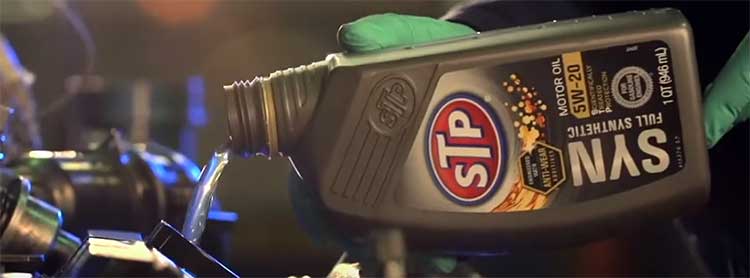
STP Full Synthetic Oil is another wallet-friendly option, retailing at about $28 for 5 quarts. It’s widely available at places like Walmart, which beats Ravenol’s online-only hassle. STP’s formula is designed for high-mileage engines, with additives to reduce leaks and oil burn-off.
I tried STP’s 5W-30 in my Jetta before switching to Ravenol, and while it kept the engine running fine, it didn’t feel as refined. STP’s oil seemed to thin out faster in hot weather, and I didn’t notice any fuel economy gains.
Ravenol’s USVO technology and low-friction additives gave my car a noticeable boost in smoothness and efficiency. STP is great for older, less demanding engines, but Ravenol’s advanced tech makes it the better pick for modern, turbocharged vehicles like mine.
- Ravenol Vs. DuraMAX Full Synthetic Oil
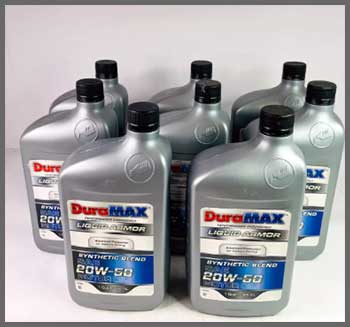
DuraMAX Full Synthetic, often used in fleet vehicles, is priced around $30 for 5 quarts and focuses on durability for heavy-duty use.
It’s formulated with Group III base oils and robust detergents, making it a favorite for trucks and SUVs.
I haven’t used DuraMAX in my Jetta, but a friend who runs it in his Ford F-150 swears by its ability to handle towing and high temperatures.
However, DuraMAX doesn’t offer the same range of manufacturer-specific approvals as Ravenol, which is a big deal for European cars.
Ravenol’s CleanSynto tech also keeps engines cleaner than DuraMAX, which showed some sludge buildup in my friend’s truck after 10,000 miles.
For heavy-duty applications, DuraMAX is a strong contender, but Ravenol’s precision engineering and performance edge make it my go-to for my VW.
Why Ravenol Stands Out?
Ravenol’s focus on European vehicles and motorsport applications gives it a unique edge. Its PAO-based oils outperform the Group III-heavy formulas of Kendall, STP, and DuraMAX in viscosity stability and engine protection.
While these competitors are more affordable and accessible, they cater to broader, less specialized needs. Ravenol’s tailored formulations, like VMO 5W-40 for VW, ensure my Jetta runs smoother and more efficiently.
If you’re after premium performance and don’t mind the price, Ravenol’s the champ. For budget or general-purpose use, Kendall, STP, or DuraMAX might suffice, but they don’t match Ravenol’s finesse.
Frequently Asked Questions (FAQ)
Ravenol is produced by Ravensberger Schmierstoffvertrieb GmbH, a German company founded in 1946 by Hans Triebel in Werther, Westphalia. They’ve grown from a small operation to a global brand, supplying oils to over 80 countries. Their focus on quality and innovation, especially in motorsport, has made them a trusted name for car enthusiasts like me.
Ravenol’s price comes from its premium ingredients, like PAO-based synthetic oils and advanced additives like USVO and CleanSynto. These ensure top-notch performance, especially for European and high-performance engines. You’re also paying for their rigorous quality control and authenticity checks. While it’s pricier than mainstream brands, the benefits—like better protection and efficiency—justify the cost for many.
It depends on your car and needs. Ravenol excels for European vehicles and high-performance engines, thanks to its PAO-based oils and specific approvals (e.g., VW 502.00). Mobil 1 and Pennzoil are great for general use and affordability, while Castrol suits manufacturer-backed needs. Liqui Moly is a solid German alternative, but Ravenol’s motorsport edge makes it my top pick for my Jetta.
Most Ravenol motor oils, like VMO 5W-40 or EFE 0W-16, are fully synthetic, using PAO base oils for superior performance. However, some products, like certain DSG transmission fluids, may use Group III hydrocracked oils, which are still synthetic but less premium. Always check the product specs on Ravenol’s site to confirm.
Conclusion: Why Ravenol Wins Me Over?
After months of using Ravenol, I’m convinced it’s the real deal. My Jetta runs smoother, starts better, and feels happier with every mile. The price might sting, but the protection, efficiency, and peace of mind are worth it.
If you want an oil that treats your engine like royalty, Ravenol’s your pick. Grab a jug, verify its authenticity, and give your car the love it deserves—you won’t regret it.

